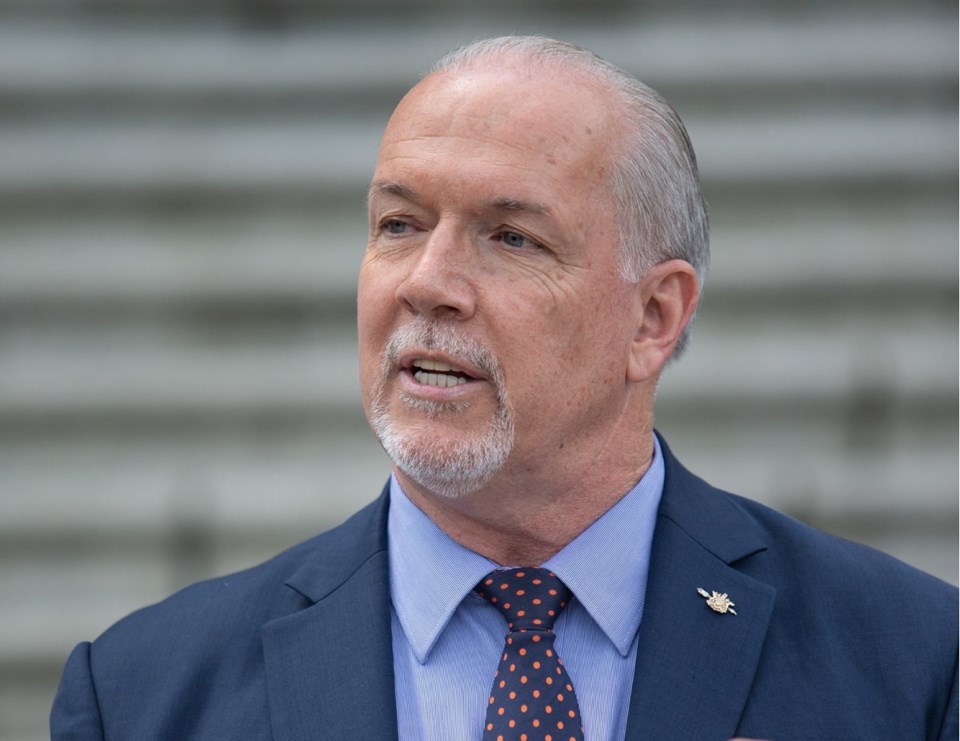Remember in the first Austin Powers movie where the arch-fiend Dr. Evil quite rightly vented frustration to his henchpeople over how the specifications for his torture chamber were not fulfilled?
“I have one simple request. That is to have sharks with frickin’ laser beams attached to their heads! Now evidently my cycloptic colleague informs me that that cannot be done. Would you remind me what I pay you people for, honestly?”
That’s close to what Premier John Horgan must be feeling after the B.C. Utilities Commission finished its report on gas prices.
All he wanted was to watch an officially independent commission publicly flog the oil robber barons for gouging south-coast residents at the pumps. Instead, he got a dense analysis that grinds through every macro and micro-economic detail behind how the prices ticking over at gas pumps are set.
Sample: “Thus, where there is a competitive functioning market charging below the marginal rate it will present export arbitrage opportunities and charging above it will result in import arbitrage opportunities.”
The treatise concludes prices are higher than they would be in a perfect theoretical world, but it can’t explain why.
When it comes to what to do about it, the B.C. Utilities Commission dodged the issue, saying it needs further study.
Why couldn’t the commission just confirm what everybody already thinks, that the oil companies are the villains?
Why does everything have to be so complicated?
Horgan ordered up the inquiry when gas prices started flirting with $1.70 a litre in Metro Vancouver. That’s apparently the magic price point where perennial grumbling turns into public outrage.
And public outrage demands a political response. So Horgan sicced the BCUC energy-policy dogs on the problem, although on a very short leash.
He granted his government immunity even before they started work, by prohibiting the inquiry from looking at gas taxes. “The commission may not inquire into the effects of provincial enactments or policy on gasoline and diesel price,” read the terms of reference.
The sub-text was: “Go find someone to blame for high prices, but don’t look at us.”
One of the few definitive findings in the report was that the market is an “oligopoly.”
That conjures up images of foreign Mafiosi with diamond pinkie rings, which is along the lines of what the NDP government wanted to hear.
But even that declaration is couched carefully.
“The wholesale market is considered an oligopoly, although a highly concentrated market does not, in itself, imply that any one company, or combination of companies, control the market.
“However, combined with the results of the market concentration test, the control of the distribution infrastructure gives the wholesale gasoline market characteristics of a natural monopoly.”
The report came out in August. The oligarchs and others were given another chance to submit, and a supplementary report landed this week. It stands pat for the most part, saying there’s an “unexplained” price premium of up to 13 cents a litre on B.C.’s south coast.
Horgan this week insisted it’s “a gouge” that costs people hundreds of millions a year. That word doesn’t appear in the BCUC conclusions, but he takes his validation where he can find it.
He’s going to raise it with Prime Minister Justin Trudeau, because the federal government has the power to investigate it. He also has some other ideas that will be announced in coming weeks.
But what’s also unexplained is the discrepancy between this push for lower gas prices and the government-wide climate-change policy.
It’s all about getting off oil, and higher gas prices dovetail perfectly with that goal. When the government raises the carbon tax on gasoline, that’s a good thing.
But when oil companies hike the price for their own selfish reasons, that’s a bad thing that needs official inquiries and federal intervention.
The only difference is where the money goes. Here’s a modest proposal: If the NDP government simply taxed the oil companies the equivalent of another 13 cents a litre, the gouging would be converted to a worthy climate-change initiative, because the cash would go to the government, not the oligarchs. And we wouldn’t have to wrestle with “arbitrage opportunities,” “the marginal barrel concept” and “spot price versus rack price” issues.



